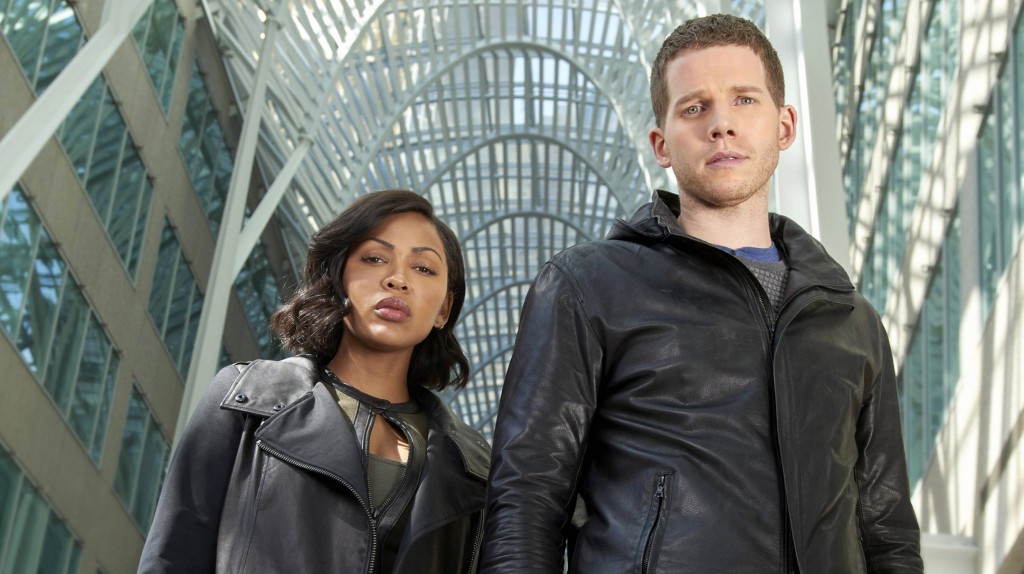We’re increasingly reaching a peak with what ideas we can recycle in film and television and how much the public can take of it all. There are times when even I’m unsure of what to make of a Hollywood inundated with dozens of sequels and reboots; while I’m going to see Star Wars: The Force Awakens and Batman v. Superman: Dawn of Justice on opening night, the high-minded dork in me sometimes asks what we’re accomplishing by following up so often on old ideas or reviving somewhat new ones merely years after they seemed to work.
Less common is the transition between film and television, although this year certainly packs its share of TV retellings and follow-ups, from CBS’ Limitless and Supergirl to FOX’s Minority Report. If the latter is any indication, though, this is a trend that needs to end sooner rather than later: Minority Report is a master class in how to take a worthy concept and do everything excruciatingly wrong with it.
[youtube http://www.youtube.com/watch?v=_fLl-DMzxrk&w=560&h=315]
Minority Report will forever be a footnote in history as the first television adaptation of a Steven Spielberg film (itself an adaptation of Philip K. Dick’s arresting short story). With a career stretching into its fifth decade and with more than $8 billion in box office receipts to its name, you’d think some Spielberg project would’ve been ported to the small screen by now. (The best candidate: Spielberg’s other film of 2002, the fact-based jet-setting caper Catch Me If You Can, if only because a Jurassic Park show would cost $80 million an episode.)
But this show won’t do anything to make audiences speak fondly about the film. Set a decade after Tom Cruise’s whodunit caper resulted in the shuttering of “Precrime”—the controversial use of psychic technology to stop murders before they happen—the three “Precogs” have been given the gift of leading real lives. But Dashiell (Stark Sands) is still plagued by visions of murder, and decides to risk his safety—not to mention the safety of his twin brother Arthur (Nick Zano) and foster sister Agatha (Laura Regan)—by aiding idealistic homicide detective Lara Vega (Meagan Good) with his unusual gifts. Together, they attempt to bring down Washington, D.C.’s murder rate a little more, all the while ducking Vega’s smarmy supervisor Will Blake (an unremarkable Wilmer Valderrama). Along the way, Dash’s precog companions begin to have terrible visions of a society ready to put them back in the Precrime program, just as they were ten years prior.
It’s all a headscratcher, to say the least: Minority Report the film was a feast of a blockbuster, offering a bounty of big ideas both visual (desaturated colors depicting a world overrun by technology and advertising) and intellectual (a meditation on how far the government should go to protect its constituents, a salient point raised only nine months after September 11th). Like a particularly bad student driver, Minority Report the series takes that framework and hits the gas without realizing the car is in reverse. Why on Earth would Dash willingly risk himself for a system that saw him as little more than a circus freak in the first place? Why does Vega, a bizarre nostalgist who listens to Iggy Azalea on vinyl (y’know, the way we listened to all the classics), believe in the power of Precrime when Spielberg spent 145 taut minutes suggesting it was probably a bad thing? Why is Dash the hero when the standout Precog in the film was Agatha, now confined to a weird, vaguely sinister side role?
[youtube http://www.youtube.com/watch?v=bD2-lX-bhjc&w=560&h=315]
It only gets worse once the episodes get going, and viewers have to deal with the dual headache of a dull psychic-infused crime procedural (nowhere near the first of its kind, I’m sure) and a mishmash of sloppily executed topical jokes and subplots. Gone is the wall-to-wall hypertargeted branding of the original film, now replaced with dopey, generic “future” images and geriatric jokes about how much easier it used to be when dating involved Tinder. The killer of the week formula has thus far led to villains that play like bad ironic retweets from my timeline—there’s the former Precrime victim who wants to kill a politician with birds(?!), a bartender-cum-MRA who’s mad that a hot female patron doesn’t reciprocate his feelings, and some bland tech bro.
None of that, however, seems as dumb as the dual bubbling sci-fi sub-plots that are cooking on the back burners. The one about “Hawkeye,” a new predictive crimestopper pilot program, is meant to ask The Big Questions about our civil liberties but I’d guess will ultimately ask little of substance that Minority Report‘s parent film didn’t ask 13 years ago. And the precogs’ visions of a new Precrime program, combined with Vega’s foolhardy belief in the system, further entangles the show in a needlessly reductive Möbius strip, where none of the characters have learned from the mistakes made in the original story. Precrime doesn’t work—why press the issue any further?
Three episodes in and Minority Report manages to do wrong by anyone who might be interested: fans of the film, of police procedurals, of sci-fi thrillers, and of coherent television in general. In a more perfect world, we’d be able to see a disaster like this coming from a mile away, and do everything we can to prevent it from happening. If only there was a science behind that.

